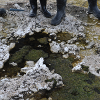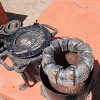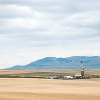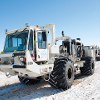Natural Resources and Fossil Energy


ERI researchers perform surface and subsurface analysis of sedimentary basins for identification of reservoirs for fossil energy and for geologic carbon sequestration. Experimental investigations study chemical reactions between supercritical CO 2, brine and reservoir rocks during injection of CO 2 for geological carbon capture and storage (CCS) or enhanced oil recovery (EOR).
Researchers

Dave Bowen is a research professor in the Earth Sciences Department. He studies the structure and geology of underground reservoirs to determine how much carbon dioxide they might be able to sequester. Much of his attention has been focused on Kevin Dome, a geologic formation in north-central Montana that acts as a natural CO2 reservoir.
Dr. Bowen can be reached at 406-994-6916 or [email protected].

Andrew Laskowski is an assistant professor in the Earth Sciences Department and is a structural geologist with expertise in continental tectonics, deformation of the Earth’s crust, and relationships between geologic structure and economic resources. Dr. Laskowski is interested in the tectonic processes that create and destroy mountain belts. His research integrates geologic mapping and structural analysis with detrital and igneous U-Pb geochronology, (U-Th)/He thermochronology, and metamorphic petrology to test and/or create tectonic models. He is involved in field-based research focused on extension dynamics, continental subduction, and the suturing process in the western United States and southern Tibet (Xizang), China. Dr. Laswoski is also involved in research that applies detrital zircon geochronology to test provenance, determine maximum depositional ages, and track changes in the geochemistry of magmatism throughout the orogenic cycle.

David Mogk is a professor of geology in the Earth Sciences Department. His main research interests include: evolution of Precambrian crust in southwestern Montana, including petrogenesis of continental crust, geochemical evolution of the crust, mid-crustal petrologic processes, and tectonic evolution of the Wyoming Province from the Archean through the Proterozoic; characterization of the morphology, composition, structure, and surface chemistry of minerals using a combination of SEM/EDSBSE/CL, powder XRD, Time-of-Flight SIMS, X-ray photoelectron spectroscopy, and atomic force microscopy; characterization of life in extreme environments, including Yellowstone hot springs and Lake Vostok (Antarctica) ice core; geoscience education, including development of digital libraries for Earth science education, teacher preparation and enhancement, and research on learning.
Dr. Mogk can be reached at 406-994-6916 or [email protected].
Website: http://www.montana.edu/earthsciences/facstaff/mogk.html

Dr. Colin Shaw is an assistant research professor in the Earth Sciences Department. His research areas are: Structural geology, continental tectonics, rheology of natural materials, reactive transport of fluids in the crust, and applications in carbon sequestration.
Dr. Shaw can be reached at 406-994-6760 or [email protected]
Website: http://www.montana.edu/earthsciences/facstaff/shaw.html





